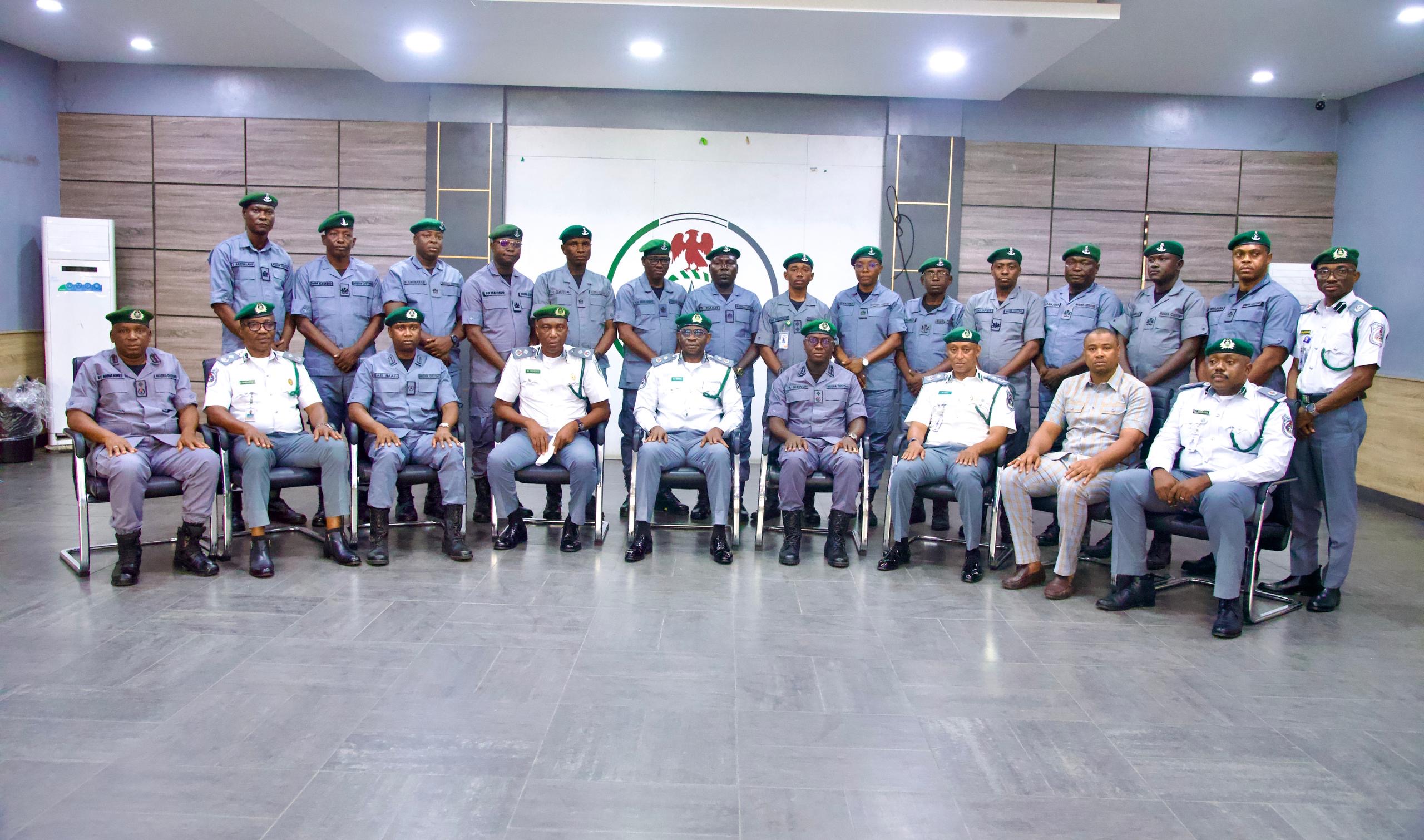
The Nigeria Customs Service Apapa Area Command has hosted officers of Junior Course 23 from the Nigeria Customs Command and Staff College (NCCSC) Gwagwalada, as they commence their 2025 Operational Study Tour aimed at evaluating the impact of customs modernisation on trade participation in Nigeria.
The visit which took place on 17th November ,2025, provided officers with an opportunity to observe first hand operational and administrative functions of one of the country’s busiest ports.


The Customs Area Comptroller of Apapa Command, Comptroller Emmanuel Oshoba, who received the team, described the theme of the tour as both timely and relevant. He highlighted that the NCS has implemented a comprehensive modernisation programme designed to transform operations, enhance efficiency, and strengthen service delivery to stakeholders. He noted that Apapa Command is at the forefront of these efforts, serving as a strategic hub for national and regional trade.
According to the Area Controller, Apapa’s modernisation initiatives include the Time Release Study, the Authorized Economic Operator programme, electronic cargo tracking, the One-Stop-Shop initiative, and the Advanced Ruling System. He also announced the forthcoming Fast-Track Standard scheme, all aimed at reducing clearance times, improving security, and facilitating trade.
Comptroller Oshoba, reaffirmed his commitment to supporting the students throughout the tour and strengthening his drive for operational excellence. He also emphasised that such visits are critical to fostering collaboration, promoting innovation, and reinforcing the service’s role in facilitating trade, ensuring border security, and contributing to national economic growth.
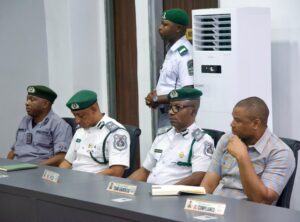
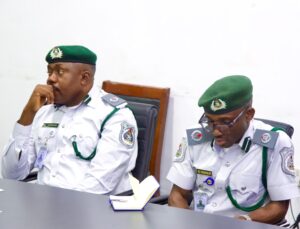
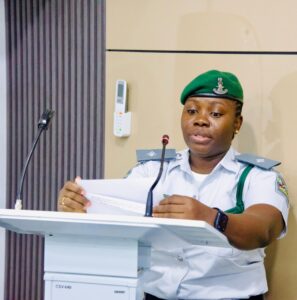
Deputy Comptroller of Customs D.A. Ikewun, a member of the Directing Staff and Team Coordinator for Group 1 of Junior Course 23 at the Nigeria Customs Command and Staff College, Gwagwalada, in his presentation explained that the ongoing study tour is a critical component of the Junior Course academic curriculum. He said the exercise provides operational level officers undergoing professional training with an opportunity to examine real life administrative and enforcement challenges within the Nigeria Customs Service and propose practical solutions.


According to Ikewun, the tour enables participants to conduct on the spot assessments of ongoing modernization programmes and procedures at selected commands. It is designed to deepen students’ understanding of the operational structures that drive customs activities while preparing them for higher command and staff responsibilities within the Service.
Ikewun described the Nigeria Customs Command and Staff College as the apex training institution of the Service, modeled after the Armed Forces Command and Staff College. He explained that the Junior Course, which runs for three months and leads to the award of the Vast Junior Staff Course (VJSC) certificate, is structured into a general studies phase and an occupational study phase covering areas such as service correspondence, public speaking, classification, valuation, enforcement, and modern customs techniques.


He noted that students of Junior Course 23 have been divided into four groups for one week research tours to selected commands, including Apapa Area Command, Lilypond Export Command, Port Harcourt Area II Command, and Ports and Terminal Multiservices Limited (PTML) Area Command. The Apapa team is conducting research on “Assessing the Impact of Customs Modernization on Trade Facilitation in Apapa Area Command,” aligned with the study tour theme, Evaluating the Impact of Customs Modernization on Trade Facilitation.
He pointed out that the theme aligns with the World Customs Organization’s 2025 focus on efficiency, security, and prosperity in the global supply chain, while also supporting the policy thrust of the Comptroller General of Customs, Bashir Adewale Adeniyi on consolidating gains and leveraging technology and stakeholder collaboration. He said the students’ research will examine Apapa Command’s operational reforms, the effectiveness of technology driven clearance systems, challenges faced in modernization, and strategies to further enhance trade facilitation at Nigeria’s premier port.





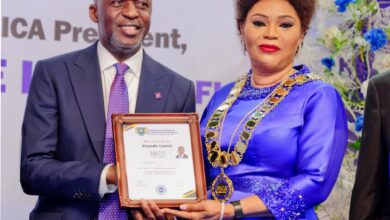

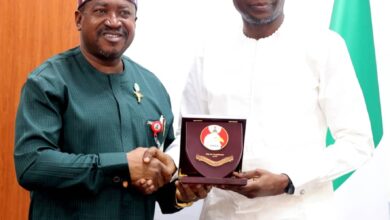



It’s fascinating how gaming platforms are evolving – blending classic appeal with modern tech! Seeing bingo incorporate slot mechanics, like with happy bingo download apk, is a smart move for engagement. Mobile accessibility is key these days, too!
Bạn có thể chơi lô đánh đề từ 1.000+ kỳ quay thưởng đang diễn ra liên tục và hốt tiền cực nhanh chỉ sau 1 giây. 888slot com link cung cấp nhiều kiểu cược xổ số khác nhau như: Bao lô, đánh đề, 3D, lô trượt, 4 càng giải Nhất,… đặc biệt là Up/Down, Reverse, Big/Small,… vừa mới “ra lò”.
slot365 com Trong quá trình trải nghiệm bet thủ chắc chắn sẽ cảm thấy thích thú và dành chiến thắng dễ dàng bởi hệ thống tính năng hỗ trợ được thiết kế đầy đủ. Mỗi siêu phẩm săn thưởng còn được cung cấp bí kíp riêng giúp bạn tối ưu chiến thắng nhanh chóng từ chuyên gia. Người chơi có thể tham khảo và lựa chọn sử dụng nếu cảm thấy phù hợp.
nhà cái 188v nổi tiếng với dịch vụ cá cược thể thao đa dạng, bao gồm các môn thể thao phổ biến như bóng đá, bóng rổ, tennis, đua ngựa và nhiều giải đấu lớn trên toàn cầu. Người chơi có thể tham gia đặt cược trực tiếp, với tỷ lệ cược luôn được cập nhật liên tục, đảm bảo sự minh bạch công bằng. Không chỉ vậy, nơi này còn cung cấp nhiều loại kèo khác nhau, từ kèo châu Âu, kèo châu Á, kèo tài xỉu cho đến kèo phạt góc, kèo hiệp phụ nhiều hình thức cược khác, đáp ứng đầy đủ nhu cầu của khách hàng.
xn88 app com là nhà cái cá cược trực tuyến uy tín hàng đầu châu Á, được cấp phép hoạt động bởi tổ chức First Cagayan Leisure & Resort Corporation (First Cagayan) uy tín tại Philippines. Với hơn 10 năm kinh nghiệm hoạt động, trang web đã và đang thu hút đông đảo người chơi tham gia.
Những điểm ấn tượng chỉ có tại nhà cái 188v game